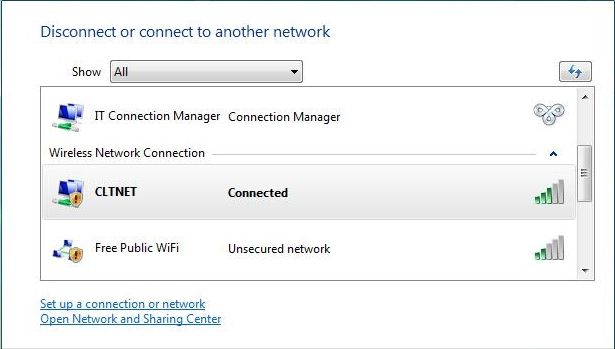Strictly speaking, we've already told you a lie. You can connect to "Free Public WiFi" you just won't be able to access the internet through it.
The chances are that if you're reading this story, you know what we're talking about. You're sitting in an airport, railway station, conference hall, or any public place and you're looking to get online - usually without the aid of 3G. You're searching for some nearby small business or some unsuspecting dope who hasn't had the sense to password protect the rich resource that is their wireless network. You seek to plunder their booty.
Then, as if by magic, something even better pops up on your network list. Not only is it unprotected but it's actually called "Free Public WiFi ". Well, what do you know? There was no need to do this on the sly after all. It turns out you're sitting in some area of free internet access. There's a brief "thank you" to which ever public organisation you did or didn't vote for which provided this blessing to the people, you hit connect, open your browser and, and, nothing.
No internet to be seen. It's a ruse! You've been tricked and you disconnect sharpish in case this is some honey trap and you've just had your entire life skimmed from under your nose. How foolish. In search of something devious it is you that has been deviated. You search for another network. You find nothing. You give up and you wait 'till you're back at home. You hope that nothing will happen. Well, the answer is that it will and it won't.
What's actually going on here is a quirk of Windows XP. The "Free Public WiFi" SSID that you see in the network list is in fact an ad hoc network from a nearby computer of a person who once did exactly what you have just done in searching for a free ride. XP is automatically set up to search for ad hoc networks if it can't find and connect to any of the usual ones in your preferred networks list. This, of course, would be the case while out an about somewhere new where there are none of your normal internet access points.
The "Free Public WiFi" network appears on the list and you connect to it. What you've actually done is connected to someone else's laptop close-by which is using its network card to broadcast an ad hoc network of its own and, yes, this network is called "Free Public WiFi". So, obviously, when you do connect to this mini network, naturally, there is no internet access. Interestingly, there is access to whatever files and folders that other person has declared they're willing to share and vice versa, but the connection is usually so brief, once the realisation that you can't get your e-mail kicks in, that it's not an issue.
You might think that's the end of it but when you chose to connect to this ad hoc network, you didn't uncheck the box that reads "connect to this network automatically". So, when you next turn your laptop on in another public zone, your system will run through all the networks you've successfully connected to in the past and see if any of them is available. It won't find any of your usual connections - home, work, your mate's place - and then it comes across the ad hoc "Free Public WiFi" network that it managed to connect to before and that's when the quirk occurs.
When XP finds this situation and no other nodes of the already established ad hoc network around, it is automatically set to switch your computer's network card to broadcast as a node of this network itself. What this means for you is that when someone else in the same area as you is looking for some cheeky internet access, they'll come across your computer broadcasting with the SSID of "Free Public WiFi", they'll connect to it, automatically save it to their machine and so the anomaly is spread.
Quite where this all started from, nobody knows. Perhaps it was once someone who had an internet connection and invited others nearby to use it by connecting to his/her machine in an adhoc fashion? So, this unintentional trick may have been, at its start, one of generosity. Hard to tell. What we do know is that the quirk was patched some time later by Microsoft and if you're using subsequent versions of Windows, then you won't become a carrier.
In a way, it's quite sad that we'll soon see this interesting misfit of networking disappear as XP is phased out and indeed you could even use it as a marker of just how much market share the OS still has. While there's time, you might even try releasing your own adhoc network into the wild and see how long it takes to come back to you. The question is, what could be more enticing than "Free Public WiFi"?

